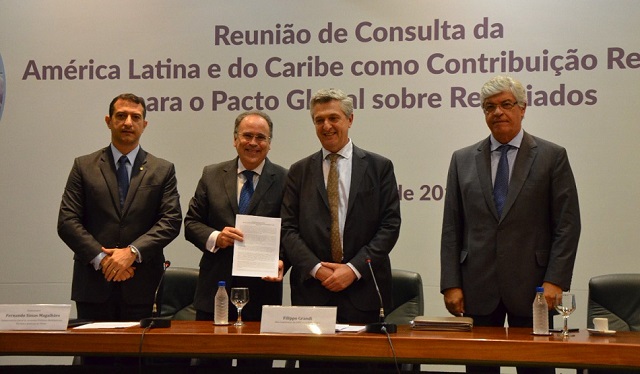
Brazil’s policy of open doors, and open arms reminds us to offer safety to those united by hardship
COMMENT | ALOYSIO NUNES FERREIRA | Recently, leaders from Latin America and the Caribbean met in Brazil to discuss solutions to the global refugee crisis. Observer countries, international organisations, and representatives of civil society also took part in the dialogue, which was co-hosted by the Brazilian government and the Office of the United Nations High Commissioner for Refugees.
The aim of the two-day gathering was to strategise new ways to assist the millions of displaced people in the region and around the world. Their conclusions will help form the regional contribution to a new “global compact on refugees,” which will be presented to the UN General Assembly later this year.
Addressing the plight of refugees is one of the greatest challenges currently facing the international community. With some 65.6 million people forcibly uprooted by violence, natural disasters, and economic hardship, there are more displaced people today than immediately after World War II. And, because no country is immune to the consequences associated with large movements of refugees, only a coordinated response can ameliorate the suffering. Rather than closing borders, as some governments have done, the international community must work together to address the issue of global displacement.
As we search for solutions, it is important to remind ourselves that while refugees may flee for different reasons, they are united by hardship. As UN Secretary-General António Guterres notes, refugees are the “most vulnerable of the vulnerable,” people who have been driven from their countries, families, and friends, not by frivolous impulse, but by persecution and conflict. In other words, no matter where refugees are going, they are running for their lives.
In response to this tragic reality – and despite being saddled by a severe fiscal crisis that has led to austerity measures at home – Brazil’s government has accelerated efforts to protect those arriving on our shores. Through the establishment of new integration and resettlement programs, Brazil is reinforcing an open-door policy toward refugees, the displaced, and the stateless, while also signaling our leadership on this issue.
For example, in January 2012, Brazil established a humanitarian visa program to benefit Haitians forced to flee after the devastating 2010 earthquake. More than 85,000 Haitians migrated to Brazil, and all had their legal status quickly resolved, enabling them to work, study, and use the public health-care system. This effort not only afforded a degree of dignity to the displaced; it also helped insulate refugees from “coyotes,” smuggling networks that prey on the destitute and desperate.
Then, in 2013, another humanitarian visa program was created, this time to benefit people affected by the conflict in Syria; more than 10,000 entry visas were eventually allocated as part of that initiative. Finally, in late 2017, Brazil adopted a new national migration law, which guarantees migrants the same legal protections as citizens, in line with the human-rights principles that inform Brazil’s foreign policy. The legislation also helped simplify the naturalisation process for the stateless, virtually eliminating the issue of statelessness in Brazil.
Every country has a responsibility to help those in need. Nevertheless, at the moment, some countries are doing more than others to assist refugees. Of the world’s refugee population, 84% are currently hosted by developing countries. As that figure clearly shows, a new approach, based on shared responsibilities, is urgently needed. That is why the regional meeting that Brazil hosting this February was so important. Simply put, Brazil wanted to share what it has learned.
For decades, Latin American and Caribbean countries have pursued a unified approach to aiding the displaced, while our legal frameworks have set the global standard for refugee protection. For example, in 1984, the region’s landmark Cartagena Declaration on Refugees committed signatories to the principle of non-refoulement. Three decades later, regional governments renewed this pledge by adopting the Brazil Declaration and Plan of Action, which aims to end statelessness in the region by 2024, among other goals.
These multilateral agreements are in addition to unilateral policies adopted by countries in the region. Such policies include constitutional protections for asylum seekers, provision of temporary identification documents, and guaranteed access to public education, banking, and health-care services.
As these measures demonstrate, governments in Latin America and the Caribbean have laid the groundwork to strengthen the international response to the world’s refugee crisis. Brazil’s goal is to channel the region’s collective experience into a more equitable, global solution. After the region’s leaders meeting in Brasília recently, and when they join world leaders in New York later this year, we must inspire one another to ease the suffering of the many millions who have suffered enough. Only through open doors – and open arms – will the world’s refugees find safety.
*****
Aloysio Nunes Ferreira is the Minister of Foreign Affairs of Brazil.
Copyright: Project Syndicate, 2018.
 The Independent Uganda: You get the Truth we Pay the Price
The Independent Uganda: You get the Truth we Pay the Price



